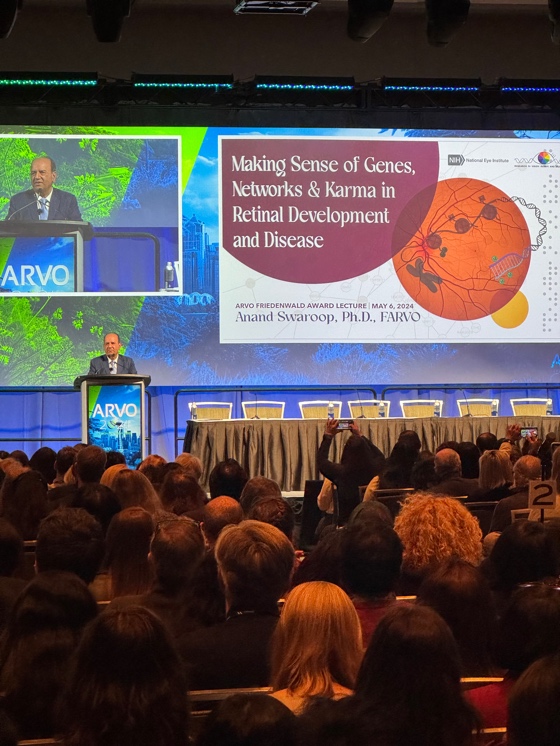Timothy T. Xu, MD
Mayo Clinic, Rochester, MN
The 2024 Friedenwald award was awarded to Dr. Anand Swaroop, Ph.D., who is a Senior Investigator and Chief of Neurobiology, Neurodegeneration, and Repair Laboratory (his favorite acronym, NRL) at the National Eye Institute. This prestigious award acknowledged Dr. Swaroop’s outstanding contributions to retinal development, aging, and neurodegeneration in visual science. His lecture was titled, “Making Sense of Genes, Networks, and Karma in Retinal Development and Disease.”

Dr. Swaroop began his lecture by acknowledging the many individuals he is grateful for, including his multiple trainees who are presenting at ARVO this year, his parents who were teachers, his upbringing in India, his family who provided him with direction in his career, and his graduate school and post-doctorate classmates and mentors.
![]()
His career started at University of Michigan where his work focused on the genetics of retinitis pigmentosa. He told an inspiring story of meeting a young woman with Leber’s congenital amaurosis who deeply moved Dr. Swaroop and inspired him to further his work in vision research. He discussed his pivotal work on developing methods for cDNA cloning and focusing on NRL (neural retina leucine zipper) as a transcription factor for rod photoreceptors, and the interaction between NRL and CRX (a gene that when mutated is responsible for some forms of Leber’s congenital amaurosis) particularly in the activation of rhodopsin.
![]()
The key question he presented as his current research focus included how genetic information influences the morphology and function of retinal neurons, how genetic variation affects healthy and diseased neurotypes in the retina, and how aging and environmental factors influence genetic expression and function. Using age-related macular degeneration as an example, he described his work in GWAS studies to highlight the multifactorial nature of the disease. He described the increasing number of genetic loci associated with AMD highlighting the need to understand how these variants contribute to the disease, and discussed efforts to identify rare or ultra-rare variants in coding regions which can help establish causality.
Dr. Swaroop then discussed the impact of non-protein variants on gene regulation, highlighting the complexity of how these variants can influence the expression of neighboring genes or genes located far away. Recent work of Dr. Swaroop’s lab included conducting fusion mapping of EQTLs and DNA methylome analysis, identifying 87 gene-epigenome interactions and revealing important pathways related to retinal function and disease. He then discussed drug discovery and pharmacology using retinal organoids, as well as “karma’s” role in changing the phenotype trajectory. Dr. Swaroop concluded by discussing “karma’s” power to influence our environment, diet, and actions, which can significantly impact our health outcomes.
![]()